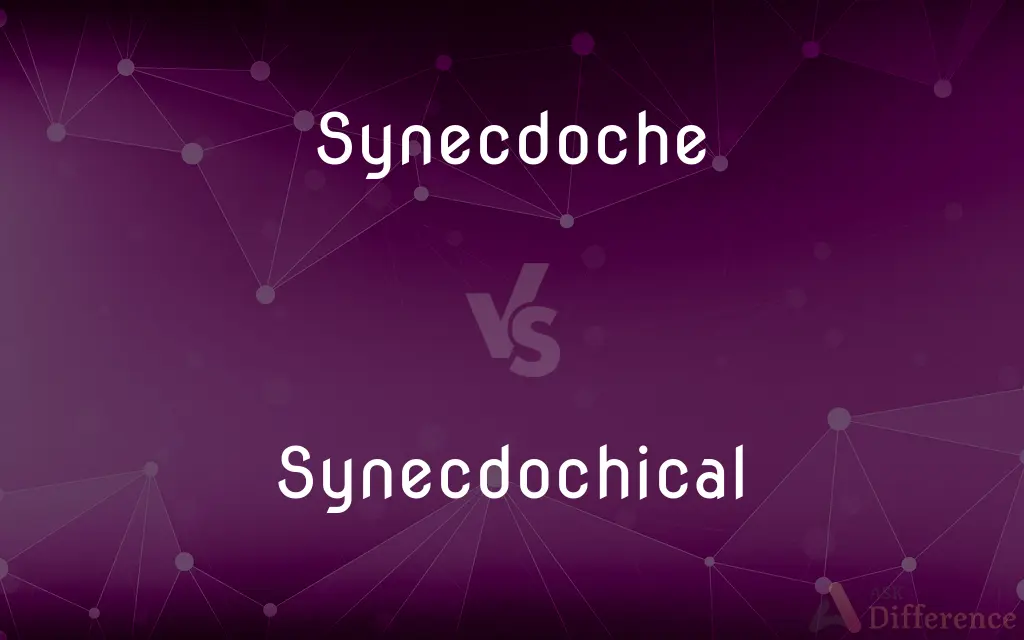Synecdoche vs. Synecdochical — What's the Difference?
By Fiza Rafique & Maham Liaqat — Updated on March 24, 2024
Synecdoche refers to a figure of speech, while synecdochical is its adjectival form.

Difference Between Synecdoche and Synecdochical
Table of Contents
ADVERTISEMENT
Key Differences
Synecdoche is a rhetorical device where a part represents the whole or vice versa, enriching language and meaning. For example, calling a car "wheels" uses a part (wheels) to represent the whole (car). Whereas, synecdochical pertains to the use or characteristic of synecdoche in language or literature. It describes how a phrase or word functions synecdochically within a context.
Synecdoche often appears in literature and everyday speech, making expressions more vivid and concise. "All hands on deck" is a common synecdochical phrase where "hands" (a part) stands for the sailors (the whole). On the other hand, synecdochical adjectives describe instances or qualities of this rhetorical technique, emphasizing the figurative aspect of a term or phrase.
The effectiveness of synecdoche lies in its ability to convey complex ideas simply and memorably. It encapsulates broader concepts or entities in singular, tangible terms, as in "breadwinner" for a family's financial provider. Synecdochical expressions, therefore, hinge on the strength and clarity of the synecdoche, enhancing understanding and engagement.
Understanding synecdoche requires recognizing the interchangeability of parts and wholes within a context, a skill that enriches comprehension and expression. Conversely, identifying something as synecdochical involves analyzing its role in the larger rhetorical or literary framework, appreciating the depth and nuance it adds.
In language, synecdoche's usage spans creative to colloquial realms, demonstrating its versatility and impact in shaping thought and dialogue. Synecdochical, as an adjective, specifically qualifies the nature or occurrence of this figure of speech within various forms of communication, from poetic devices to everyday idioms.
ADVERTISEMENT
Comparison Chart
Definition
A figure of speech where a part represents the whole or vice versa.
Adjective describing the use of synecdoche in language or literature.
Usage
In literature and speech to convey complex ideas simply.
To describe phrases or instances that employ synecdoche.
Examples
"All hands on deck" - hands represent sailors.
A synecdochical phrase like "The White House announced" where "The White House" stands for the U.S. administration.
Purpose
To enrich language and enhance expression through vivid imagery.
To specify the nature of a phrase or word as embodying synecdoche.
Impact on Language
Makes expressions more concise and memorable.
Highlights the figurative aspect of terms or phrases.
Compare with Definitions
Synecdoche
A whole representing a part.
America winning a gold medal, where America stands for the athletes.
Synecdochical
Descriptive nature.
A synecdochical phrase like The Oval Office for the U.S. President emphasizes the setting's role.
Synecdoche
A part representing the whole.
Referring to a car as wheels illustrates synecdoche by focusing on a part.
Synecdochical
Figurative usage.
Describing an initiative as White House-led uses a synecdochical approach for clarity.
Synecdoche
Material for the object.
Steel for sword, using the material to represent the object made from it.
Synecdochical
Colloquial expression.
Saying Nice wheels to compliment someone's car is a synecdochical compliment.
Synecdoche
The specific for the general.
Bread for food, using a specific item to represent the general category.
Synecdochical
Rhetorical application.
A synecdochical argument might use boots on the ground to discuss military presence.
Synecdoche
The general for the specific.
The crown for the king, using a general symbol to represent a specific figure.
Synecdochical
Literary technique.
A novel might employ synecdochical descriptions for vivid imagery, like sails for ships.
Synecdoche
A synecdoche ( sin-NEK-də-kee, from Greek συνεκδοχή, synekdochē, 'simultaneous understanding') is a figure of speech in which a term for a part of something refers to the whole of something or vice versa.A synecdoche is a class of metonymy, often by means of either mentioning a part for the whole or conversely the whole for one of its parts. Examples from common English expressions include "suits" (for "businessmen"), and "boots" (for "soldiers") (pars pro toto).
Synecdochical
A figure of speech in which the name of a part is used to stand for the whole (as hand for sailor), the whole for a part (as the law for police officer), the specific for the general (as cutthroat for assassin), the general for the specific (as thief for pickpocket), or the material for the thing made from it (as steel for sword).
Synecdoche
A figure of speech in which the name of a part is used to stand for the whole (as hand for sailor), the whole for a part (as the law for police officer), the specific for the general (as cutthroat for assassin), the general for the specific (as thief for pickpocket), or the material for the thing made from it (as steel for sword).
Synecdochical
Using an inclusive term for something included, or vice versa; using something spoken of as the whole (hand for laborer) or vice versa (the court for the judge).
Synecdoche
(figure of speech) A figure of speech that uses the name of a part of something to represent the whole, or the whole to represent a part.
Synecdochical
Expressed by synecdoche; implying a synecdoche.
Isis is used for Themesis by a synecdochical kind of speech, or by a poetical liberty, in using one for another.
Synecdoche
(rhetoric) The use of this figure of speech.
Synecdochical
Using the name of a part for that of the whole or the whole for the part; or the special for the general or the general for the special; or the material for the thing made of it;
To use `hand' for `worker' or `ten sail' for `ten ships' or `steel' for `sword' is to use a synecdochic figure of speech
Synecdoche
A figure or trope by which a part of a thing is put for the whole (as, fifty sail for fifty ships), or the whole for a part (as, the smiling year for spring), the species for the genus (as, cutthroat for assassin), the genus for the species (as, a creature for a man), the name of the material for the thing made, etc.
Synecdoche
Substituting a more inclusive term for a less inclusive one or vice versa
Common Curiosities
What makes a phrase synecdochical?
A phrase is synecdochical when it employs synecdoche, using a part to represent the whole or vice versa.
What is synecdoche?
Synecdoche is a figure of speech where a part is used to represent the whole or vice versa.
Is synecdoche common in everyday language?
Yes, synecdoche is common in both everyday speech and literature, making expressions more vivid.
How is synecdochical used in language?
Synecdochical is an adjective that describes the use or characteristic of synecdoche in language or literature.
Can you give an example of synecdoche?
"All hands on deck" is an example, where "hands" represents the sailors.
How does synecdoche affect communication?
Synecdoche simplifies and enriches communication by using parts to represent wholes, making ideas more relatable.
Are synecdochical terms always obvious?
Synecdochical terms might not always be obvious and can require context or cultural knowledge to understand.
How do synecdoche and synecdochical relate to each other?
Synecdoche is the figure of speech, while synecdochical refers to the use or characteristic of synecdoche in expression.
What is the difference between synecdoche and metaphor?
Synecdoche involves parts and wholes, while a metaphor equates two different things for rhetorical effect.
Can synecdochical expressions be literal?
Synecdochical expressions are not literal; they use parts or materials to figuratively represent wholes or objects.
Why use synecdoche in writing?
Synecdoche adds depth and creativity to writing by enabling concise and impactful expression.
What role does synecdochical play in poetry?
In poetry, synecdochical descriptions enhance imagery and emotional resonance.
Can synecdoche be visual?
Yes, synecdoche can also be visual, like in film or art, where a part symbolizes a whole.
Can synecdoche be used in non-fiction writing?
Yes, synecdoche can be used in non-fiction to make descriptions more vivid and engaging.
How can synecdoche help in storytelling?
Synecdoche can make storytelling more engaging by encapsulating complex ideas or settings in simple terms.
Share Your Discovery

Previous Comparison
Epicycloid vs. Epitrochoid
Next Comparison
Express vs. ImpressAuthor Spotlight
Written by
Fiza RafiqueFiza Rafique is a skilled content writer at AskDifference.com, where she meticulously refines and enhances written pieces. Drawing from her vast editorial expertise, Fiza ensures clarity, accuracy, and precision in every article. Passionate about language, she continually seeks to elevate the quality of content for readers worldwide.
Co-written by
Maham Liaqat















































